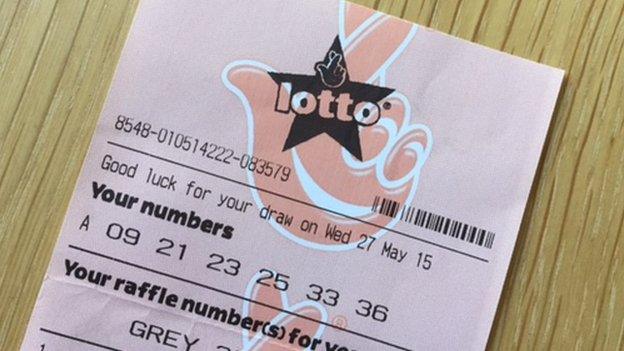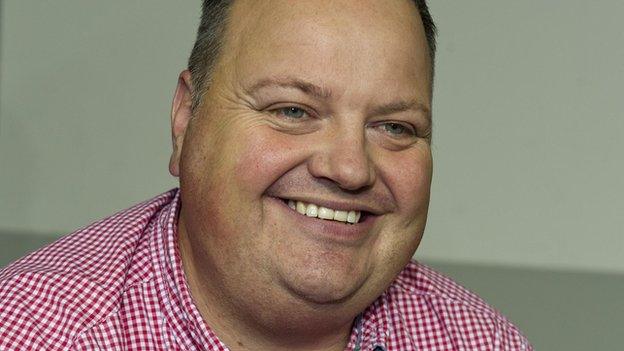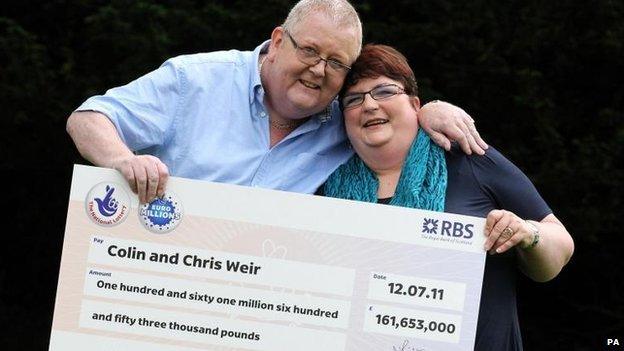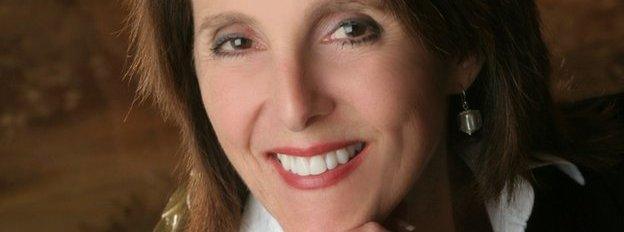Who advises overnight lottery millionaires?
- Published

It could be you - but it wasn't with this ticket
On Wednesday, one winner scooped the quadruple rollover National Lottery jackpot of more than £13.5m.
With a perfect match of winning numbers - 12, 27, 28, 39, 41 and 48 - the ticket holder was immediately launched into the exclusive club of the UK's ultra-rich.
That, according to those who assist big money winners, is a "daunting" experience that leaves most of them in shock.
They say it can take a couple of years for these millionaires to find the rhythm of their new-found riches.
Understanding the reaction and requirements of these lottery winners can tell us a lot about coping with sudden wealth, from inheritance to rapid business success.
Money man

Andy Carter says winners usually want to pay off their mortgages
Anyone who has a lottery win of more than £50,000 receives a visit from Andy Carter or one of his team of five winners' advisers.
The 41-year-old, employed by lottery operator Camelot, checks the ticket-holder's identity and other paperwork then oversees the bank transfer of the prize. No longer is it written on a cheque and, unlike some overseas lotteries, the money is paid immediately in one lump sum rather than in instalments.
After nine years in the role, Mr Carter has seen the full range of reactions and spending plans, from plastic surgery to buying a fireworks company.
"By the time I get there [the day after the winners' call], some have already arranged a viewing on a house," he says.
"But the perception is that winners go out and buy a fast car. They don't. They are in shock. They realise they need some help."
He is not allowed to give any financial advice, but he does suggest that winners take a holiday before the spending starts.
He says a tiny minority of winners either go out and blow the cash, or do the opposite and put the money in a bank account and leave it untouched.
"A win does not change people's values around money, it exaggerates them," he says.
Most want to pay off a mortgage, and find the lack of ceremony when it is done to be strange. Nearly all want to look after their families' finances.
He suggests that people take their time and do not promise anything straight away.

Chances of winning

The odds are firmly stacked against players winning the National Lottery jackpot.
There are various odds for the different games but the chances of winning the Lotto jackpot is one in 14 million. The average jackpot won on the Lotto is £2.1m.
The price of a ticket to play went up to £2 from £1 in October 2013.
The National Lottery is one of many different ways of betting in the UK. GamCare, external provides information, support, advice and free counselling for those who get into gambling problems and addiction.

Financial advice

Some wins are bigger than others. Colin and Chris Weir won the largest Euromillions jackpot in the UK
"When there's a win of £5m then everyone becomes a financial expert," says Mr Carter.
Those who win less than £500,000 will be given some leaflets on managing their money. For the really big winners, financial advisers arrive a few days later.
Camelot operates a rota of banks and financial firms who visit to explain the principles of risk and reward, and independent advice. The winner can then contact them, or seek their own advice.
Those scooping, say, £5m will have their winnings put into an account with one of a selection of private banks.
On that list is Coutts. Camilla Stowell, the bank's head of international and private office, is among those who have advised lottery winners.
"It is exciting [for winners], but it suddenly becomes very daunting. We encourage them to take their time and feel what it is to be wealthy," she says.
She says that winners tend to ask how much they can get out of the bank, and whether they can quit their job.
For her part, she stresses that the bank, via an assigned private banker, can make payments for their immediate "passion" purchases. Most importantly, the first tasks are to clear any debts and ensure that winners have a will.

What the winners said

"When she won the lottery she was sitting here crying. It was too much stress for her." - Mother of Jane Park, who won £1m at the age of 17.
"It will enrich her life so much and that's the most important thing on the agenda." - Paul and Debbie Lawton, who planned to use their £6.9m helping their three children including eldest daughter Tracey who has cerebral palsy.
"Being Trotters we were always going to be millionaires one day." - Neil Trotter, who won £107.9m on the Euromillions lottery.

'Financial headaches'

Wealth is not just a world of yachts and fast cars, experts say
Once the initial shock dies down, winners need guidance with seemingly simple financial considerations, Ms Stowell says.
Those who choose to move to a bigger home need to consider and budget for all the extra costs a bigger property brings - from utilities to cleaning.
Gifts to friends and family can be complicated to structure in the most appropriate way, especially if they want to provide them with an income, rather than a lump sum.
Although the winning sum is tax-free, any subsequent income made from it is taxable. Suddenly, somebody who might only ever have paid tax via PAYE is facing a more complex tax bill.
Ms Stowell says that half of the bank's time with winners is spent on advice, with the other half on guidance and education about money.
"We tell people not to be fearful of their wealth but it often brings headaches," she says.
"There is the financial jargon, and it often brings the best, and worst, out of family and friends."
Coutts organises dinners for wealthy clients to talk to each other about their experiences, privately, and also hosts insight days to explain financial terms, rules, and products.
In time, many winners ask for advice on how to give money to charity, often anonymously.
After five or 10 years, most want to organise their financial legacy for the next generation.
Caution
So does dealing with the super-rich leave Ms Stowell and Mr Carter dreaming of wealth of their own.
The former admits she plays the lottery every week. Her biggest win has been £25.
The latter, as a Camelot employee, is not allowed to play. He has met more than 1,000 big winners and the football and cricket fan says that if he had wealth like theirs he would travel the world watching sport.
After nearly a decade in the job - including a time of turmoil for the UK economy - he says he has noticed people becoming more financially savvy, more aware of financial hardship, more cautious, and more understanding of the difference between banking and financial advice.
That, in itself, is something to celebrate, even for those who never win a million.

How to cope

Thayer Willis is the daughter of one of the founding brothers of the multibillion-dollar Georgia-Pacific Corporation. This, she says, led to her learning some "powerful lessons". She is now an author and wealth counsellor. We asked her what, in her opinion, were the most useful of those lessons:
"During [the] first year there is a lot you need to do. This is your year of financial education. Do not underestimate the importance of educating yourself," she says.
"You need a team of people in place before you do anything at all with the money. During your first year with the money, interview, interview, interview advisers.
"It is up to you to match your needs with the advisers' expertise, because expertise will vary even within a well-defined profession.
"The most important lessons in life are caught, not taught. Those closest to you will be more influenced by what you do than by anything you say."